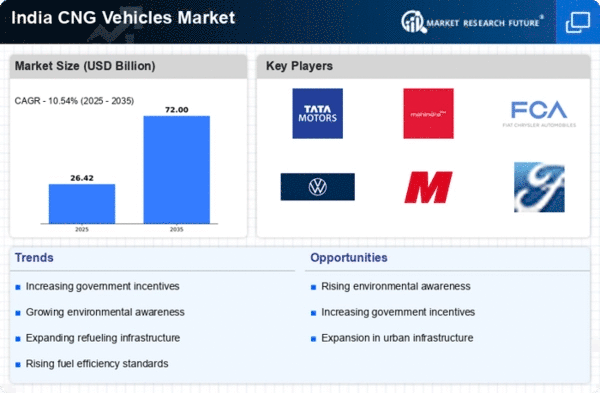Rising Fuel Prices
The escalating prices of conventional fuels such as petrol and diesel are driving consumers towards alternative options, including the cng vehicles market. As fuel prices continue to rise, the cost-effectiveness of CNG becomes increasingly appealing. In India, the price of CNG is often significantly lower than that of petrol, with a difference of approximately 30-40%. This economic advantage encourages consumers to consider CNG vehicles as a viable option. Additionally, the The CNG vehicles market is likely to benefit from growing awareness.. As more consumers seek to reduce their fuel expenses, the demand for CNG vehicles is expected to increase, further propelling the market forward.
Environmental Concerns
Growing environmental awareness among consumers and policymakers is significantly influencing the cng vehicles market. CNG is recognized for its lower emissions compared to traditional fuels, producing up to 80% less nitrogen oxides and virtually no particulate matter. This aligns with India's commitment to reducing air pollution and greenhouse gas emissions. The government has set ambitious targets for cleaner transportation, which may lead to increased incentives for CNG vehicle adoption. As urban areas grapple with severe air quality issues, The CNG vehicles market is positioned to play a crucial role.. The potential for CNG to contribute to a more sustainable transportation system is likely to resonate with environmentally conscious consumers.
Technological Innovations
Technological advancements in the automotive sector are playing a pivotal role in shaping the cng vehicles market. Innovations in CNG engine technology, fuel efficiency, and vehicle design are making CNG vehicles more appealing to consumers. Manufacturers are increasingly investing in research and development to enhance the performance and reliability of CNG vehicles. As of November 2025, several new models featuring advanced CNG technology have been introduced, showcasing improved mileage and reduced emissions. These innovations not only attract environmentally conscious consumers but also address concerns regarding the performance of CNG vehicles. The ongoing evolution of technology in the cng vehicles market is likely to drive further adoption and acceptance among consumers.
Government Policies and Incentives
The Indian government has implemented various policies and incentives to promote the adoption of CNG vehicles, which is a key driver for the cng vehicles market. Initiatives such as tax exemptions, subsidies, and reduced registration fees for CNG vehicles are designed to encourage consumers to make the switch. Furthermore, the government is investing in expanding CNG infrastructure, including refueling stations, which enhances the accessibility of CNG vehicles. As of November 2025, the number of CNG stations in India has increased significantly, with over 1,800 stations operational across the country. These supportive measures are likely to stimulate growth in the cng vehicles market, making it a more attractive option for consumers.
Urbanization and Population Growth
Rapid urbanization and population growth in India are contributing to the expansion of the cng vehicles market. As cities become more congested, the demand for efficient and environmentally friendly transportation solutions is increasing. CNG vehicles are perceived as a practical alternative to traditional vehicles, particularly in densely populated urban areas. The rising number of vehicles on the road has led to increased traffic congestion and pollution, prompting consumers to seek cleaner options. This trend is likely to benefit the CNG vehicles market., as urban dwellers prioritize sustainable transportation solutions. Additionally, the government's focus on developing public transportation systems that incorporate CNG vehicles may further enhance market growth.
















